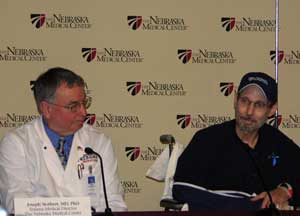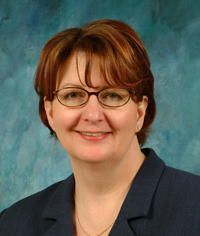 |
From left: UNMC’s Joe Stothert, M.D., Ph.D., and Fred Wilson, a survivor of the Dec. 5 Westroads Mall shootings, at a news conference on Dec. 19. Wilson, who sustained a gunshot to his right arm that caused him to lose nearly four liters of blood, will speak at the 6th annual Nebraska Disaster Behavioral Health Conference on July 18. |
All of the above incidents are reminders of fatal disasters that could potentially cause psychiatric problems such as post-traumatic stress disorder.
On July 18, mental health professionals will gather to attend the sixth annual Nebraska Disaster Behavioral Health Conference and discuss the psychological aspects of dealing with such disasters and other mass casualty situations.
Sponsored by the Nebraska Department of Health and Human Services, University of Nebraska Public Policy Center, UNMC’s Department of Psychiatry, BryanLGH Medical Center, Lincoln Metropolitan Medical Response System (LMMRS), Omaha Metropolitan Medical Response System (OMMRS) and The Center for Biopreparedness Education, the event will be held at the Embassy Suites Hotel, 555 S. 10th St., in Omaha.
“I think that the events of the past eight months here have made it very clear that disaster behavioral health emergencies occur and that the skills to respond are needed,” said Robin Zagurski, a clinical social worker in UNMC’s psychiatry department.
Zagurski, who provided mental health assistance to families of Von Maur and Little Sioux tornado victims, said there is a distinct difference between traditional behavioral health and disaster behavioral health.
“Often, traditional behavioral health therapists are used to working with people some time after they have experienced a trauma, but not usually within minutes or hours,” she said. “Disaster behavioral health responders try to prevent people from having increased problems because of what they’ve experienced. What they do is make sure people are able to function and that they move forward.”
 |
Robin Zagurski |
Von Maur survivor Fred Wilson will speak about how time and faith has aided his ability for forgiveness and resiliency.
Bruce Shapiro, who went from crime reporter to crime victim when he was critically injured in a stabbing in 1994, will discuss the role and impact of news media before during and after disasters and critical incidents. He also will instruct participants in effective pre-incident networking and communication and identify effective innovations in communication.
“The conference involves a very heavy topic with mass casualties,” Zagurski said. “Fred will set the tone by talking about forgiveness and we’ll talk a lot about mass casualty situations, but we’ll end on a lighter note with a Personal Protective Equipment (PPE) fashion show.”
Al Berndt, assistant director of the Nebraska Emergency Management Agency, will deliver the opening remarks at the conference, which will feature presentations on the topic of disaster behavioral health including the following:
- Fred Wilson, Von Maur survivor, “Forgiveness and the Fullness of Time.”
- Brian Flynn, Ed.D., associate director of the Center for the Study of Traumatic Stress, adjunct professor of psychiatry, Uniformed Services University of Health Sciences, “Disaster Behavioral Health in 2008: Problems, Possibilities and Public Policy.”
- Bruce Shapiro, executive director of the Dart Center for Journalism and Trauma, “The Role and Impact of News Media in Disasters and Critical Incidents.”
- Andrew Klatte, assistant deputy director of the Office of Emergency Preparedness, Indiana Division of Mental Health and Addiction, “Behavioral Health Emergency Response Teams.”
- John Filippi, D.D.S., board certified forensic odontologist, “DMORT Teams and the Forensic Disaster Response in a Mass Fatality Incident.”
To register for the conference, visit http://www.disastermh.nebraska.edu or contact Janell Walther at (402) 472-5678 or jwalther2@nebraska.edu. The fee is $55.